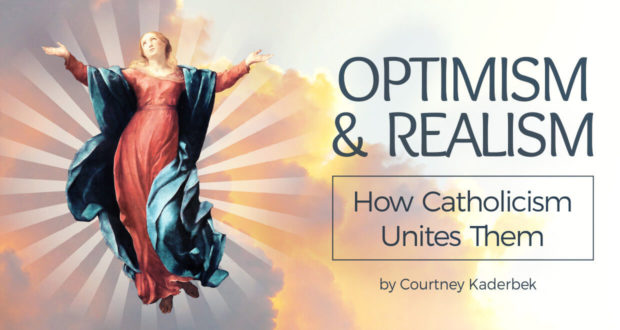Summary
We live in a society dominated by two worldviews that seem to totally contradict each other: Optimism and Realism. Optimism encourages us to believe in ourselves and foster a self-empowering mindset.We live in a society dominated by two worldviews that seem to totally contradict each other: Optimism and Realism.
Optimism encourages us to believe in ourselves and foster a self-empowering mindset. This worldview can be seen everywhere, from the perky self-affirmations bombarding the blogosphere to the “Life is Good” and “Keep Calm” merchandise littering the marketplace.
On the other hand, Realism scorns what it sees as an attempt to ignore the ugly realities of life. At its worst level, it not only accepts this ugliness as inevitable, but also embraces it as desirable. Secular entertainment is saturated with this kind of Realism and does not hesitate to show the reality of man’s attraction to evil.
These worldviews are the result of the splitting of one Truth into two dangerous, unbalanced falsehoods. In actuality, Optimism and Realism were never meant to be separate worldviews at all, but instead two components of one true worldview, which can be found in the teachings of the Catholic Church.
Optimism: The Search for Paradise
Optimism is the manifestation of the secular world’s search for Paradise. The Optimist makes the mistake of placing all hope of attaining such happiness in himself, instead of in God. This false hope will inevitably end in despair, because the Optimist will never possess the inner strength to live up to this impossible expectation.
Optimists accuse the Catholic Church of not being optimistic enough. They label the Church a “doom and gloom” religion that encourages people to dwell on their moral failings.
Yet the Church only bids us call to mind our failures so that we might all the more quickly do away with them. Instead of languishing in our sins, as Realism deems unavoidable, or stubbornly denying them, as Optimism encourages, the Church calls us to overcome our sins through God’s grace, so that we might truly become a holy people worthy of Paradise. As Venerable Fulton J. Sheen once noted, “A sinner’s awareness of sin is one requisite for his recovery.”
By acknowledging the reality of sin, we are protected against a false sense of Optimism in self that leads to despair, as well as spurred to change ourselves for the better.
In fact, the Catholic Church promotes an Optimism that far surpasses the world’s Optimism. The world does not believe perfection is possible, or that a perfect Paradise exists. But the Church claims that perfection is every person’s destiny, and that everyone who achieves it will enjoy eternal Paradise.
Even more, she claims that our sufferings are the means by which we experience Paradise on earth and merit its fullness after death.
Sometimes even devout Catholics fall into the trap of secular Optimism, desiring to feel in control of their lives and free from anxiety. However, the solution is not to place our trust in our own wills – oftentimes, we are the cause of our own anxieties!
Rather, we must realize that there is a reason to be confident and unafraid, but that it lies in God, Who can bring about what is right even when our willpower fails us.
We should remind ourselves constantly of God’s protection and guidance with the ejaculatory prayer, “Jesus, I Trust in You!” especially in moments of worry and doubt. Even if we cannot banish our anxiety, we can nonetheless be comforted knowing that such anxiety is groundless when we are in God’s hands.
Realism: The Search for Truth
Realism is, by contrast, a manifestation of the secular world’s search for Truth. Yet Realists make the mistake of acknowledging life’s realities without accepting Christ’s teachings which give men hope amidst them. By accepting reality without the consolation of supernatural hope, Realists tread a path that ultimately leads to despair.
Realists accuse the Church of not being realistic about the human condition. According to Realists, the Church places an impossible expectation upon a sinful world, where abortions and divorces are a regrettable necessity, and impurity is a common fault and should therefore be made socially acceptable.
However, the Church is very realistic about the sinful state of humanity. In fact, she alone acknowledges the fullness of reality, which includes not only sin but also the Divine grace that cleanses men of sin.
Even more, she acknowledges that men are flawed; if they were not, there would be no need for her to exist, because Christ founded the Church to lift men from their sinful state by means of her teachings and sacraments.
The Church also acknowledges the inescapable suffering that all men endure. Christ never denied this, either. As Bishop Sheen explains in The Life of Christ, Christ made suffering a key component, if not the key component, of Christian life. Suffering is not in conflict with peace or joy; in fact, it is the path that leads to peace and joy.
However, Realists recognize only partial truths, such as the reality of sin but not the means to conquer it, and the reality of suffering but not its redemptive value. This kind of Realism can creep into our lives without our deliberate consent.
To combat this cynicism and moral lethargy, we should engage in periodic prayer and spiritual reading—anything that will lift our souls’ gaze to Heaven instead of focusing it on the earthly. By viewing the world through God’s eyes, we will cultivate a spirit of joy even amidst the crushing realities of life.
We should also daily commend our lives and wills to God, knowing that His graces will protect and strengthen us, even when we would otherwise succumb to temptation.
Finally, we must fight to retain joy! The secular world refuses its followers all innocent fun and offers a twisted pleasure in its place. We should not deny ourselves the relief of simple, light-hearted enjoyments. By inviting God to join us in our fun, we remain as faithful to Him in our pleasure as in our pain.
Optimism and Realism. What the world would tear into two clashing, incomplete worldviews, the Church unites into one beautiful, paradoxical Truth, reconciling the Optimist’s need for hope with the Realist’s desire for Truth.
It is an example of God’s beautiful paradoxes, which teach us the unlimited power of He Who reconciles the irreconcilable.
Works Cited
-
Sheen, Fulton. Peace of Soul. Liguori Publications, 1996.
-
Sheen, Fulton. Life of Christ. New York: Random House, Inc., 2008.

 Seton Magazine Catholic Homeschool Articles, Advice & Resources
Seton Magazine Catholic Homeschool Articles, Advice & Resources

